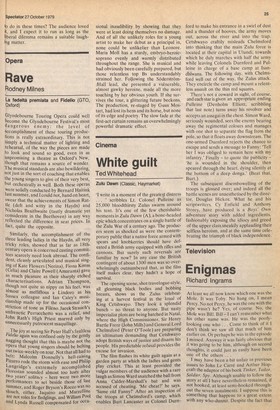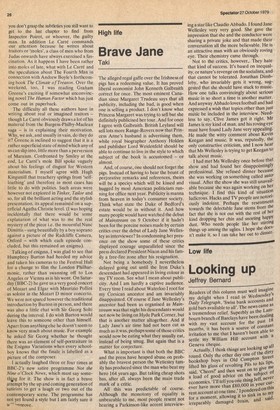Television
Enigmas
Richard Ingrams
At least we all now know which one was the Mole. It was Toby. No hang on, I mean Percy. No not Percy, he was the one with the pipe wasn't he? Yes, of course. No, the Mole was Bill. Bill — I can't remember what his other name was. He was the poofylooking one who .. . Come to think of it I don't think we saw all that much of him earlier on. Or perhaps he was in the episode I missed. Anyway it was fairly obvious that it was going to be him, although on second thoughts, it could just as easily have been one of the others .
I may have been a bit unfair in previous issues to John Le Carre and Arthur Hopcraft the adaptor of his book Tinker, Tailor, Soldier, Spy. Although unable to follow the story at all I have nevertheless remained, if not hooked, at least semi-hooked throughout the _seven instalments. I suppose this is something that happens to a great extent with any who-dunnit. Despite the fact that you don't grasp the subtleties you still want to get to the last chapter to find from Inspector Poirot, or whoever, the guilty man. In addition Le Carre commands our attention because he writes about traitors or 'moles', a class of men who from Judas onwards have always exercised a fascination. As it happens I have been rather into moles of late, what with Le Carre and the speculation about The Fourth Man in connection with Andrew Boyle's forthcom ing book The Climate of Treason. Over the weekend, too, I was reading Graham Greene's exciting if somewhat unconvincing novel The Human Factor which has just come out in paperback.
The difficulty all these authors have in writing about real or imagined traitors — though Le Carre obviously draws a lot of his material from the Burgess-Philby-Maclean saga — is in explaining their motivation.
Why, we ask, and usually in vain, do they do it? Greene is inclined to suggest that it is a rather superficial state of mind which any of us can slip into, little more than a perversion of Marxism. Confronted by Smiley at the end, Le Carre's mole Bill spoke vaguely about his feelings of disgust for Western materialism. I myself agree with Hugh Kingsmill that treachery springs from 'selfloathing' and therefore in most cases has little to do with politics. Such areas were however not explored in Tinker, Tailor and so, for all the brilliant acting and the stylish presentation, its appeal remained on a superficial Agatha Christie level. (I was hoping incidentally that there would be some explanation of what was to me the real mystery of the piece i.e. the mournful Nunc Dimittis —sung beautifully by a boy soprano against a picture of the Radcliffe Camera, Oxford — with which each episode con cluded, but this remained an enigma). Talking of enigma, I was glad to see that Humphrey Burton had heeded my advice and taken his cameras to the Festival Hall for a change to film the London Philhar monic, rather than swanning off to Los Angeles or Vienna as is his wont. On Satur day (BBC-2) he gave us a very good concert of Mozart and Elgar with Maurizio Pollini as soloist in the Mozart D minor concerto.
We were not spared however the traditional introduction by Burton in person, and there was also a little chat with Sir Georg Solti during the interval. I do wish Burton would leave this to someone other than himself.
Apart from anything else he doesn't seem to know very much about music. For example he asked Sir Georg whether he thought there was an element of self-portraiture in the Enigma Variations when every school boy knows that the finale is labelled as a picture of the composer.
I actually laughed three or four times at BBC-2's new satire programme Not the Nine o'Clock News, which must say something for it. The show is in fact a brave attempt by the up and coming generation of satirists to get a laugh or two out of the contemporary scene. The programme has not yet found a style but I am fairly sure it w." '-norove.



































 Previous page
Previous page